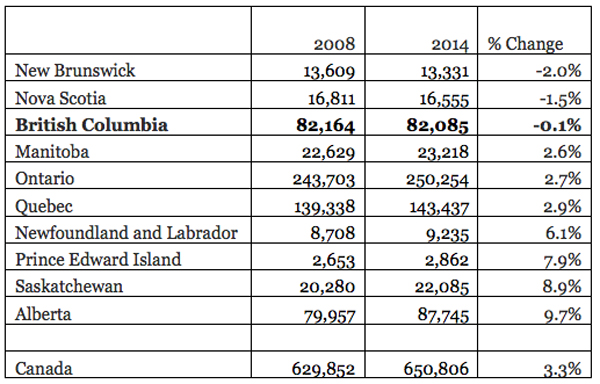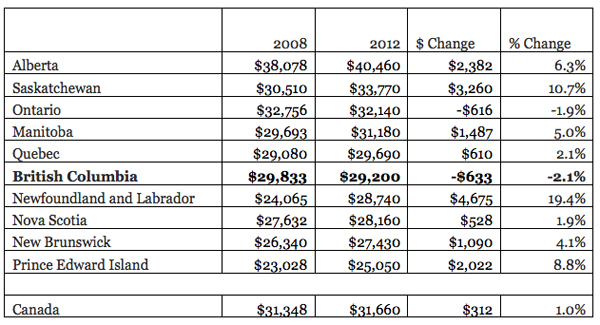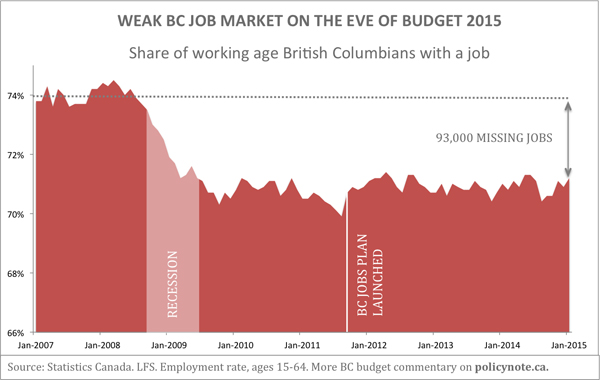2015 marks the sixth year of B.C.'s recovery from the recession. But it's been a slow and largely jobless recovery in the province. Here are three facts about jobs I'm currently tracking.
1. B.C. needs 93,000 more jobs to return to our pre-recession employment rate (the proportion of working age British Columbians who have jobs).
Only 71.2 per cent of working age British Columbians have jobs today. This is practically the same share of workers with jobs as when the BC Jobs Plan was launched, and has barely improved since the recession. In other words, the new jobs created in B.C. since 2009 have just kept up with population growth without replacing (or recovering) the jobs lost during the recession.
In order to return to B.C.'s pre-recession employment rate (the proportion of working age British Columbians who have jobs), the province would need 93,000 more jobs. That is more jobs than we have created in the five years since the recession ended! B.C. created 86,500 net new jobs in all of 2010, 2011, 2012, 2013 and 2014.
The only reason the unemployment rate is going down is because more people have stopped actively looking for work (the labour force participation rate is declining). This is a clear sign of job market weakness, not strength.
2. The total hours worked for pay in B.C. is lower now than before the recession.
The employment and unemployment statistics count a job as a job no matter if it's a casual gig or a full-time permanent job, so it's important to dig deeper. Here's what we find when we do. The total hours worked for pay in B.C. in 2014 were fewer than in 2008, despite the fact that we now have more people working. B.C. is one of only three provinces that has yet to recover the total paid hours worked since before the recession.
Total hours worked by province (in thousands)

3. Median employment income in B.C. was lower in 2012 than pre-recession.
B.C. and Ontario are the only two provinces where the median employment income has not recovered its pre-recession purchasing power. The median is more representative of how regular British Columbian families are faring than the average, which is skewed by a few very high salaries.
Today, the only provinces with a lower median income than B.C. are the Atlantic provinces. Saskatchewan, Manitoba and Quebec used to have lower median earnings than B.C. before the recession, but wage growth during the recovery has moved them ahead of B.C. Note that two of these three provinces do not have oil, so this is not a story about the oil boom.
Table 2: Median employment income by province (in 2012 dollars)

What it means
These three facts point to serious weakness in the B.C. job market on the eve of the provincial budget. They explain why many families continue to struggle with economic insecurity and poverty, and why British Columbians are taking on more and more debt.
But weak income growth is also bad for the economy -- it means less purchasing power and less domestic demand, which slows down growth.
At a time when the private sector is not investing, the B.C. government should be stepping in to boost the economy. Strategic investments in key areas including poverty reduction, universal, affordable child care, sustainable transportation, education, and community health services will strengthen our province and double as an effective Jobs Plan. This is what B.C. needs from Budget 2015. ![]()
Read more: Labour + Industry, BC Politics
















Tyee Commenting Guidelines
Comments that violate guidelines risk being deleted, and violations may result in a temporary or permanent user ban. Maintain the spirit of good conversation to stay in the discussion.
*Please note The Tyee is not a forum for spreading misinformation about COVID-19, denying its existence or minimizing its risk to public health.
Do:
Do not: